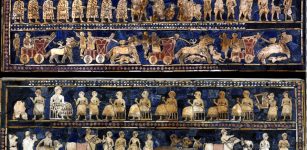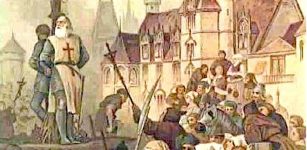Domovik: Household Spirit In Ancient Slavic Beliefs
A. Sutherland - AncientPages.com - This household spirit has many names, such as Domovik, Domovoy, Grand-father, Grandfather Well-Wisher, and he is very similar to Brownie, known from Scottish fairy lore.
Domovoi (Domovik) by Anton Shipitsaa. Image via Wikimedia Commons / Natalia.sk CC BY-SA 4.0
However, in the life of ancient Slavs, Domovik is one of the most essential mythological creatures. He protects and guards the sanctity of the home.
In old Polish beliefs, he is a caring home spirit, symbolizing abundance, often derived from the souls of deceased ancestors. His character appears in literature in the 15th and 16th centuries and later disappears.
According to a passage in a 15th-century sermon, leftovers from dinner, especially on Thursday, were left for him. In Slavic folklore, the Domovik is a male who is occasionally described as an old grey-haired man who loves fire and lives behind the hearth or a furnace. Still, others believe he has his corner in the home, where he lives and eats.
Domovik is invisible to the human eye and present everywhere inside the home at the same time, and yet, it is said that cats can see him; that is why he most probably does not like cats and chases them around the house. So, if you see your cat staring at anything inside the home (and there appears to be nothing there), the cat may be staring at Domovik.
Domovik protects the home from tragedies, disasters, diseases, thieves, forces of nature, and evil spirits.
Though Domovik never harms people, he is sometimes responsible for the so-called poltergeist activities, including physical disturbances, such as loud noises and objects being moved or destroyed.
Sometimes, the Domovik assists the family members with daily work such as household chores, feeding livestock, and assisting with fieldwork.
He can even be a babysitter for small children, who can silently play alone for hours without trouble. Or if your child says he has an imaginary friend, his friend may be Domovik.
An illustration Domovoi, a spirit of the house. image credit: Ivan Bilibin - Public Domain
But it also happens that Domovik punishes the women of the house who broke diverse, long-lasting traditions. At night, food was left out for him in his corner because it brought luck and prosperity to the household. The spirit does not eat this food but instead consumes the energy of the food left for him. An angry or abused Domovik is dangerous and can burn the house.
In ancient times, this spirit was often consulted as an oracle. If a question was asked of it and his invisible touch was gentle and soft, then it was a good omen for a family, but if Domovik's touch was cold, rough, and artless, it foretold misfortune, even death in the family.
No one knows where Domovik comes from, and it is also difficult to describe him because he is invisible, but he is always present in the home, fulfilling his duties.
Written by – A. Sutherland - AncientPages.com Senior Staff Writer
Updated on Oct 3, 2023
Copyright © AncientPages.com All rights reserved. This material may not be published, broadcast, rewritten or redistributed in whole or part without the express written permission of AncientPages.com
Expand for referencesReferences:
Kempiński A., Encyklopedia mitologii ludów indoeuropejskich
Strzelczyk J.: Mity, podania i wierzenia dawnych Słowian
More From Ancient Pages
-
 The Untold Story Of The Great Sphinx – One Of The Greatest – Part 1
Featured Stories | Aug 9, 2019
The Untold Story Of The Great Sphinx – One Of The Greatest – Part 1
Featured Stories | Aug 9, 2019 -
 Saptarishi – Seven Sages Who Guided Humanity During Four Great Ages
Featured Stories | Apr 2, 2019
Saptarishi – Seven Sages Who Guided Humanity During Four Great Ages
Featured Stories | Apr 2, 2019 -
 ‘Georgia Guidestones’: Bizarre Ominous And Strange Monument In North America
Featured Stories | Mar 27, 2022
‘Georgia Guidestones’: Bizarre Ominous And Strange Monument In North America
Featured Stories | Mar 27, 2022 -
 Mysterious Handprint And Cry For Justice From Beyond The Grave
Featured Stories | Jan 2, 2020
Mysterious Handprint And Cry For Justice From Beyond The Grave
Featured Stories | Jan 2, 2020 -
 Kadıkalesi Castle Ancient Ruins: Female Skeleton Unearthed At An Archaeological Dig
Archaeology | Jan 9, 2023
Kadıkalesi Castle Ancient Ruins: Female Skeleton Unearthed At An Archaeological Dig
Archaeology | Jan 9, 2023 -
 Unusual Secret May Be Hidden In A Mysterious Valley In The American Southwest
Featured Stories | Jan 30, 2024
Unusual Secret May Be Hidden In A Mysterious Valley In The American Southwest
Featured Stories | Jan 30, 2024 -
 Ancient Irrigation System Could Boost Water Availability In Peru
Archaeology | Jun 26, 2019
Ancient Irrigation System Could Boost Water Availability In Peru
Archaeology | Jun 26, 2019 -
 Image Of The Day: ‘The Standard of Ur – War And Peace’
Civilizations | Sep 7, 2015
Image Of The Day: ‘The Standard of Ur – War And Peace’
Civilizations | Sep 7, 2015 -
 On This Day In History: Knights Templars’ Jacques de Molay Burned At The Stake – On Mar 18, 1314
News | Mar 18, 2017
On This Day In History: Knights Templars’ Jacques de Molay Burned At The Stake – On Mar 18, 1314
News | Mar 18, 2017 -
 Secret Ancient Knowledge Of Venus – Ancient Gods, Giants And More Controversial Theories – Part 2
Featured Stories | Jul 2, 2018
Secret Ancient Knowledge Of Venus – Ancient Gods, Giants And More Controversial Theories – Part 2
Featured Stories | Jul 2, 2018 -
 Fortress Wall Of Ancient Roman City Of Sexaginta Prista Discovered
Archaeology | Apr 16, 2016
Fortress Wall Of Ancient Roman City Of Sexaginta Prista Discovered
Archaeology | Apr 16, 2016 -
 Ancient Dragon Stone That Inspired Legends Discovered In Turkey
Archaeology | Dec 12, 2018
Ancient Dragon Stone That Inspired Legends Discovered In Turkey
Archaeology | Dec 12, 2018 -
 Hidden Double Message Discovered On Ancient Clay Tablet Gives A Disturbing Account Of The Great Flood
Archaeology | Dec 5, 2019
Hidden Double Message Discovered On Ancient Clay Tablet Gives A Disturbing Account Of The Great Flood
Archaeology | Dec 5, 2019 -
 10 Enigmatic Ancient Underwater Ruins – Our Oceans Are Full Of Secrets
Featured Stories | Aug 13, 2019
10 Enigmatic Ancient Underwater Ruins – Our Oceans Are Full Of Secrets
Featured Stories | Aug 13, 2019 -
 Magical Cap Of Invisibility Worn By Athena, Hades, Hermes, And Perseus
Featured Stories | Mar 25, 2019
Magical Cap Of Invisibility Worn By Athena, Hades, Hermes, And Perseus
Featured Stories | Mar 25, 2019 -
 Gebel El Silsila: Remains Of Long-Lost New Kingdom Temple Found
Civilizations | May 19, 2015
Gebel El Silsila: Remains Of Long-Lost New Kingdom Temple Found
Civilizations | May 19, 2015 -
 On This Day In History: The Great Fire Of London – On July 10, 1212
News | Jul 10, 2016
On This Day In History: The Great Fire Of London – On July 10, 1212
News | Jul 10, 2016 -
 Ancient Burial Tomb Of A Noble Mongol Warrior With Weapons Unearthed In The Moldavian Village
Archaeology | Aug 9, 2022
Ancient Burial Tomb Of A Noble Mongol Warrior With Weapons Unearthed In The Moldavian Village
Archaeology | Aug 9, 2022 -
 Magnetic Fields Used To Explore Doggerland And Other Prehistoric Submerged Sites
Archaeology | Mar 10, 2023
Magnetic Fields Used To Explore Doggerland And Other Prehistoric Submerged Sites
Archaeology | Mar 10, 2023 -
 8,000-Year-Old Human Skeletons Found In Neolithic Village Of Slatina, Bulgaria
Archaeology | Jul 30, 2020
8,000-Year-Old Human Skeletons Found In Neolithic Village Of Slatina, Bulgaria
Archaeology | Jul 30, 2020


